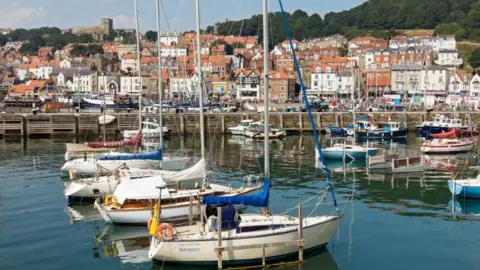Ministers propose stricter rules for holiday lets
 Getty Images
Getty ImagesHomeowners would need to get planning permission before converting properties into short-term holiday lets in tourist hotspots, under government plans aimed at easing housing problems.
There could be exemptions based on how often a home was available to tourists.
Ministers have launched a consultation on the plans, which would only apply in England.
Housing Secretary Michael Gove said too many people were being "pushed out of cherished towns, cities and villages".
Announcing the consultation, he said tourism brought economic benefits but added: "I'm determined that we ensure that more people have access to local homes at affordable prices, and that we prioritise families desperate to rent or buy a home of their own close to where they work."
The plans could help out residents struggling to find suitable housing in popular holiday destinations, including Cornwall, the Lake District and Norfolk.
The number of holiday lets in England rose by 40% between 2018 and 2021, with tourist areas such as Scarborough and North Devon seeing sharp increases, according to council figures analysed by the BBC last year.
The government says the measures are focused on short-term lets and would not affect hotels, hostels or B&Bs.
Separately, the culture department has also launched a consultation on plans to introduce a registration scheme for short-term lets.
Under the consultation, the government is expected to set a rental period of between 30 and 90 days before a homeowner would need to apply for planning permission to change the property's primary use.
Homeowners would then have to seek permission from the local council to reclassify their property as a short-term let.
The new rules would allow councils to see how much local housing stock is taken up by temporary lets. However, local authorities may choose not to use planning controls.
Culture Secretary Lucy Frazer said there was currently an "incomplete picture of the size and spread of our short-term lets market" and that a national registration scheme would provide "the data we need to assess the position and enable us to address the concerns communities face".
Airbnb - the website which enables people to advertise holiday lets - said it welcomed the scheme but warned that any changes to the planning system would need to "strike a balance between protecting housing and supporting everyday families who let their space to help afford their home and keep pace with rising living costs".

Salcombe residents bear the brunt of empty homes
Salcombe, in south Devon, has been named Britain's most expensive seaside town, with an average house price of more than £1.2m, according to Halifax.
The picture-postcard scenery speaks for itself - but its popularity comes with a cost. Rising house prices make it unaffordable for many locals, and outside of tourist season, lots of the homes are empty.
Local business owner Lucia Bly told BBC News it is very hard for businesses like hers to keep afloat outside of the summer season, when an average 25,000 people flock to the town.
 Salcombe Dairy
Salcombe DairyTourists are essentially the "lifeblood" of the town, she says. Outside of that, the town's 2,000-strong population weathers the off-season, with many homes outside of this time left empty.
Ms Bly said: "I think 75% of the houses are not lived in."

The announcement comes ahead of May's local elections in England.
Although there are no elections taking place in tourist hotspots like Cornwall and the Lake District, the impact of holiday lets have also been a key issue in other rural areas.
Conservative MPs Selaine Saxby, who represents North Devon, and George Eustice, who represents Camborne and Redruth in Cornwall, are among those who have called for stronger regulation of short-term lets.
However, former Conservative Housing Secretary Simon Clarke, said requiring planning permission to convert properties into short-term lets was "anti-business" and stemmed from "our failure to build enough homes".
Labour have accused the government of failing to build enough houses over the last 13 years. The party has said it would, if elected to government, aim to increase home ownership to 70%.
The Liberal Democrats said the consultation was "far too late for communities which have been hollowed out by a free-for-all on holiday lets".
